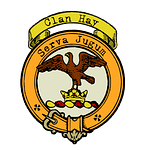Welcome back to "A Clan A Day Podcast." I'm your host, Colin MacDonald, and today, we're journeying to the farthest reaches of the Scottish Highlands, to a land of rugged landscapes and fierce warriors. Our subject is Clan Mackay, one of the most ancient and formidable clans in Scotland, whose history is intertwined with the harsh and majestic terrain of Strathnaver in the county of Sutherland, often known as "Lord Reay’s Country."
The origins of Clan Mackay are steeped in both legend and historical intrigue. While the true beginnings of the clan remain shrouded in mystery, several theories have emerged over the centuries. One tradition claims that the Mackays descended from the ancient Royal House of Moray, through the line of Morgund of Pluscarden. Another theory, backed by the 17th-century historian Sir Robert Gordon, suggests a possible connection between the Mackays and the Clan Forbes, though this is disputed by other historians.
What we do know is that by the 12th century, the ancestors of the Mackays were firmly rooted in the far north of Scotland. One key figure in the early history of the clan is Iye Mackay, who is believed to have been born around 1210. His descendants would come to dominate the lands of Strathnaver, a rugged and remote region in the northwest of Scotland, where they built a reputation as fierce and independent warriors.
The Mackays were among the earliest supporters of Robert the Bruce during the Wars of Scottish Independence, and they fought bravely at the Battle of Bannockburn in 1314. This early loyalty to the Scottish crown would characterize much of the clan's history, although their relationship with the crown was not always straightforward.
In the centuries that followed, the Mackays were embroiled in numerous conflicts, both with neighboring clans and with the powerful Earls of Sutherland, who were often their bitter rivals. One of the most famous battles in the clan's history was the Battle of Dingwall in 1411, where Angus Dubh Mackay, the 7th Chief of Clan Mackay, was captured by Donald of Islay, Lord of the Isles, in his campaign to claim the Earldom of Ross. Despite this setback, Angus Dubh later secured a significant marriage alliance with the Lord of the Isles, marrying his daughter Elizabeth and further consolidating the power and influence of the Mackays.
The Mackays were known for their ability to muster large forces. Angus Dubh, for instance, could summon 4,000 warriors from Strathnaver at a time when few other Highland chiefs could boast such numbers. However, their strength did not prevent them from suffering heavy losses in their frequent feuds with neighboring clans, particularly the Sutherlands. In 1437, for example, Neil Bhasse Mackay, the 8th Chief of the clan, led a devastating raid into Caithness, only to be killed later in a skirmish with the Sutherlands.
The clan's fortunes fluctuated throughout the 16th and 17th centuries as they navigated the turbulent political landscape of Scotland. The Mackays were staunch supporters of the Protestant Reformation and later the Covenanting cause, which put them at odds with the royalist forces during the Wars of the Three Kingdoms. This loyalty to the Protestant cause reached its zenith during the Thirty Years' War, when Sir Donald Mackay, the 1st Lord Reay, raised a regiment of 3,000 men, primarily from his own clan, to fight in Europe. This regiment, known as the "Mackay Regiment," earned a formidable reputation for its discipline and bravery.
The 17th century also saw the elevation of the Mackay chief to the peerage, with Sir Donald Mackay being created Lord Reay in 1628 by King Charles I. This title, along with the family’s extensive lands, brought the Mackays into the upper echelons of Scottish nobility, although it also led to significant financial strain, particularly during the turbulent years of the Civil War.
In the 18th century, the Mackays continued their support for the British government during the Jacobite risings. They played a crucial role in suppressing the Jacobite forces in the north, most notably during the 1745 rebellion when they helped intercept French gold intended for Bonnie Prince Charlie at the Skirmish of Tongue. Despite their loyalty to the British crown, the Mackays, like many Highland clans, were deeply affected by the Highland Clearances, which saw much of their ancestral lands sold off to the Earl of Sutherland.
One of the most notable figures in the clan's later history was General Hugh Mackay of Scourie, a descendant of the Mackay chiefs. He was a key military leader for William of Orange during the Glorious Revolution, and he played a crucial role in the Williamite victory at the Battle of Killiecrankie in 1689, although he himself was defeated in the battle.
Today, the legacy of Clan Mackay is preserved by the Mackay Society and in the land still known as "Lord Reay’s Country." The current chief of Clan Mackay, Æneas Simon Mackay, the 15th Lord Reay, holds a unique place in Scottish and Dutch nobility, continuing the clan's long and storied history.
Thank you for joining us on this journey through the history of Clan Mackay. Be sure to tune in tomorrow for another episode of "A Clan A Day Podcast." I'm Colin MacDonald, and as always, Go n-éirí an bóthar leat.













Share this post